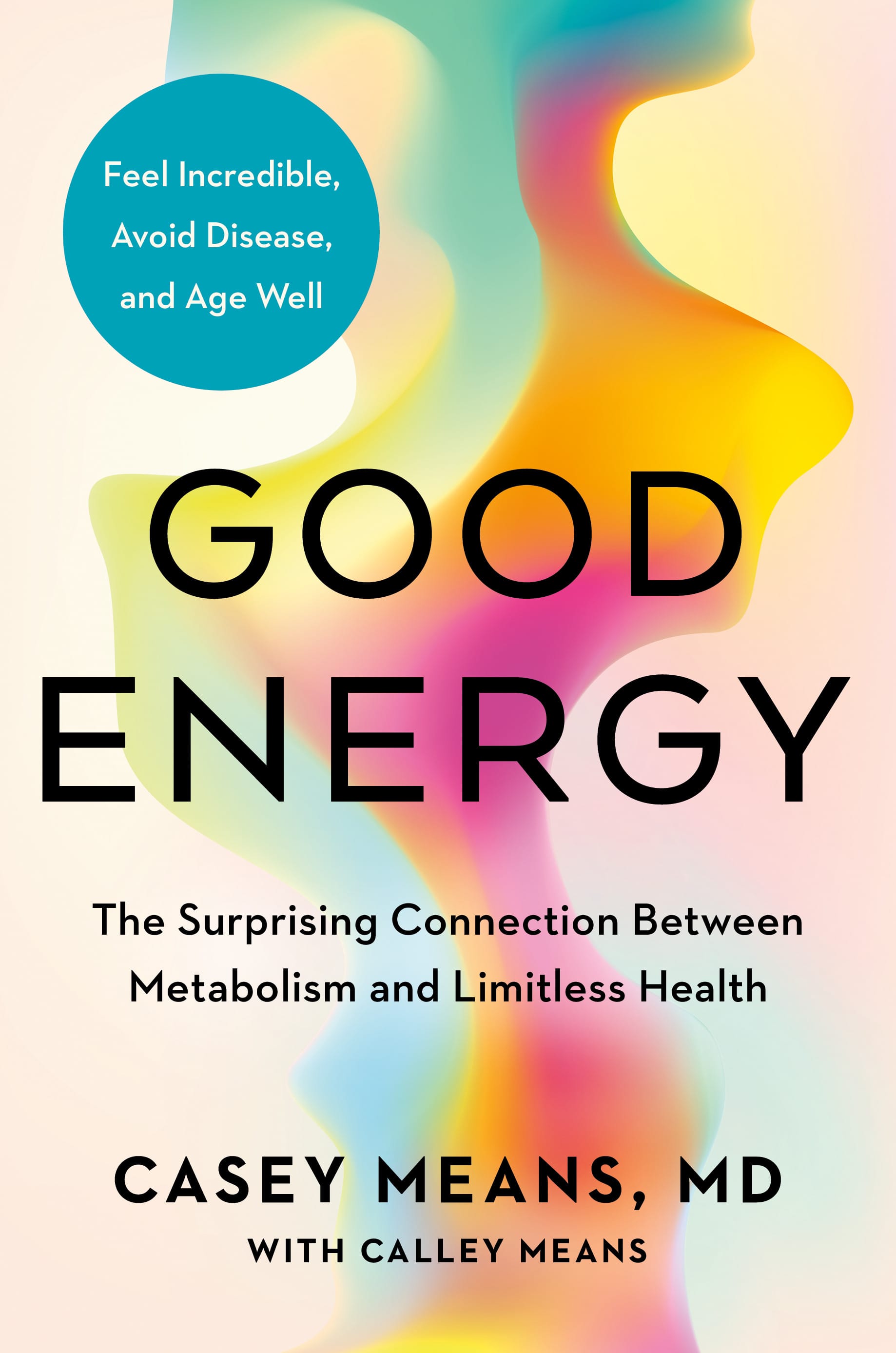Metabolic Health is All the Buzz. Dr. Casey Means Unpacks What it Really Means
At the start of her career, Casey Means, MD, was on the kind of trajectory most doctors dream of and the rest of us revere. She graduated from Stanford medical school. She held research positions at the U.S. National Institutes of Health, New York University, and Oregon Health & Science University.
Yet four years into her training as a head and neck surgery resident, she started feeling like something wasn’t quite right. Despite world-class medications and surgeries, she didn’t see patients getting better. In fact, they were getting sicker. So, she set out to figure out why.
What Dr. Means found is that the vast majority of Americans are metabolically unhealthy. “I thought I could help people through surgery, but what I realized is that you can’t operate on the root cause of what’s really making people sick, which is metabolic dysfunction,” Dr. Means tells The Sunday Paper.
Now, Dr. Means is a self-proclaimed “metabolic evangelist,” on a mission to help all of us understand metabolic health and exactly how to achieve it. We sat down with her this week to talk about her new book, Good Energy: The Surprising Connection Between Metabolism and Limitless Health and what all of us can do, starting today, to feel better now and in the future.
A CONVERSATION WITH CASEY MEANS, MD
Metabolism and metabolic health are phrases we’re using more often these days. Can you define each and explain why they’re so important?
Oftentimes people get a little intimidated when we talk about metabolism, but it’s actually an incredibly simple concept. Metabolism is how we convert food energy to cellular energy in the human body. Metabolic health is how well (or not) that process is working.
The reason these concepts are so important is because we have over 40 trillion cells in our body, all of which are literally doing trillions of chemical reactions per second, and all of those chemical reactions require energy to occur. The result of all those chemical reactions is our lives. So, it’s important to be able to effectively power each of our cells, which we do by converting food energy into cellular energy.
We take in about 70 metric tons of food in our lifetime. Our ability to effectively convert that food into energy is the foundation of literally every aspect of our health. When we talk about metabolic dysfunction, a term that’s also starting to be used a lot more, we’re talking about something not working in that process of converting food to cellular energy.
Think of each of our cells as a tiny machine that needs power to do its job, and doing its job well equals health. Anything that’s hurting the process can lead to dysfunction, which ultimately can result in symptoms or diseases in any type of cell in the body.
So, poor metabolic health is one of the reasons so many of us suffer from chronic disease?
Research from the American College of Cardiology suggests that 93 percent of American adults have sub optimal metabolic health. This means that at scale, we are dealing with an under-powering of the body crisis, so to speak. This is leading to almost every disease and chronic symptom we’re seeing in the western world today.
I realize that seems like a big statement. People might ask, “How could one issue lead to so many different conditions, from depression, anxiety, infertility and erectile dysfunction to gout, migraines, autoimmune disease, and even cancer, heart disease, Alzheimer’s, dementia and type 2 diabetes?”
The reason is this: We have over 200 cell types in our body, including specialized types of cells that make up our different organs and parts of our bodies. We have liver cells, kidney cells, retinal cells, brain cells, ovarian cells, endothelial cells lining the blood vessels—the list goes on. They’re all cells that do different things. Metabolic dysfunction leads to under-powering of our cells, which leads to different symptoms in different cell types. And the reason this is happening right now in human history is that pretty much every aspect of our default, Western American culture—from what we’re eating to how little we’re sleeping and exercising—hurts the part of the cell that transforms food energy to cellular energy and powers our metabolism, which is the mitochondria.
And because our healthcare system is not focused on mitochondrial health, we’re seeing fascinating and unsustainable trends where the more we spend on health care, the sicker we’re getting. We’re focusing on managing symptoms, which are a result of the problem, not the problem itself. Good Energy is a reimagination of how we could think about our bodies and our health using more modern and accurate scientific approaches.
So, where do we start when it comes to improving our metabolic health? Is it our food?
I am in awe of food. I think of it as this magical, cosmic material that we have the opportunity to engage with every single day and which determines the quality of our lives.
Every single molecule in our entire body is 100 percent built from food. We think of the body as an entity that lives and dies. But in reality, our body is a process that is constantly turning over and constantly exchanging matter with the environment throughout our entire lives. Billions of cells are dying and being reborn inside our bodies every day. And every day we are essentially 3D printing our body out of food. I find this really hopeful, because it means we have an opportunity every single day to choose the chemical instructions that’ll tell our genome how to be expressed.
Food is both the building block and the instructions that determine what our body of tomorrow, and next week, and next year is going to be. Through this lens, we want to choose food that’s going to increase the productivity of our metabolic processes by supporting our mitochondria.
What are the big “check engine alerts” we should be on the lookout for that are signs of metabolic dysfunction?
Every single person should make it a priority today to be able to understand where they stand on the spectrum of metabolic health. Why? For two reasons. One, because so many Americans have metabolic dysfunction. And two, because improving metabolic health is something all of us can do with simple changes, and it will have a positive impact on the way we feel.
There are a simple set of tests that are generally free at our annual physical that can give us a sense of where we’re at, which includes fasting glucose, hemoglobin A1C, triglycerides, HDL cholesterol, blood pressure, and waist circumference. I encourage everyone to track these markers yearly, because results out of the normal range for any of them can show early metabolic dysfunction—before symptoms start showing up.
You write about tools that can give us real-time evidence of our health—wearable devices that track things like sleep, heart rate, and even our glucose levels. What are your favorites, and how can we use the data to gauge whether we have good energy or not?
In terms of improving our metabolic health, the majority of progress can come from very simple strategies, like learning how to infuse more movement throughout our days. Even low-intensity movement throughout the day is incredible for keeping our mitochondria active and disposing glucose from the bloodstream throughout the day. Getting enough quality sleep and eating real, unprocessed food that keeps our blood sugar stable are other basic pillars of good habits for optimal metabolic health. And the beauty of wearables is that they can really help us see how we’re doing on some of these core pieces of our lifestyle and note where there’s opportunity for improvement.
Research shows people overestimate the amount of physical activity they do each week and sleep they get per night when you compare self-reports versus what the wearables show. So, wearables are a great way to help us have real concrete insight into what’s actually happening. They keep us honest.
So, what’s most important to track?
- Daily activity, like how many steps we’re taking per day or how many hours we’re active versus sedentary.
- Sleep, which is when we really clean out a lot of the metabolic byproducts that are generated during the day. Wearables that track sleep quantity, sleep quality, and sleep consistency—each of which independently impacts our metabolic health—can help us make sure we’re getting the rest we need.
- How our food is affecting our biology, which we can gauge using a continuous glucose monitor (CGM). We know that for optimal metabolic health, blood sugar levels should remain in a stable and healthy range. A CGM can show us in real time how the food we’re eating affects our blood sugar and how different variables—like walking after eating a meal—impacts our blood glucose levels.
What do you want all of us to take away from your book?
I want people to see this book as a comprehensive guide to health empowerment. I want you to think of it as almost as the class you never had in high school or college about the true nature of your body, how it works, and how it interacts with the environment to create the outcomes you want in your life.
Fundamentally, this is a book about how to take more ownership and control of your health journey—and exactly how to do that.

Casey Means is the co-founder of Levels, a health technology company with the mission of reversing the world’s metabolic health crisis. She received her BA with honors and MD from Stanford, was President of her Stanford class, and has served on Stanford faculty. She then trained in Head & Neck Surgery at Oregon Health and Science University before leaving traditional medicine to devote her life to tackling the root cause of why Americans are sick.
Please note that we may receive affiliate commissions from the sales of linked products.



